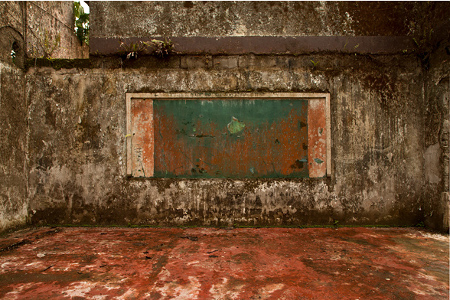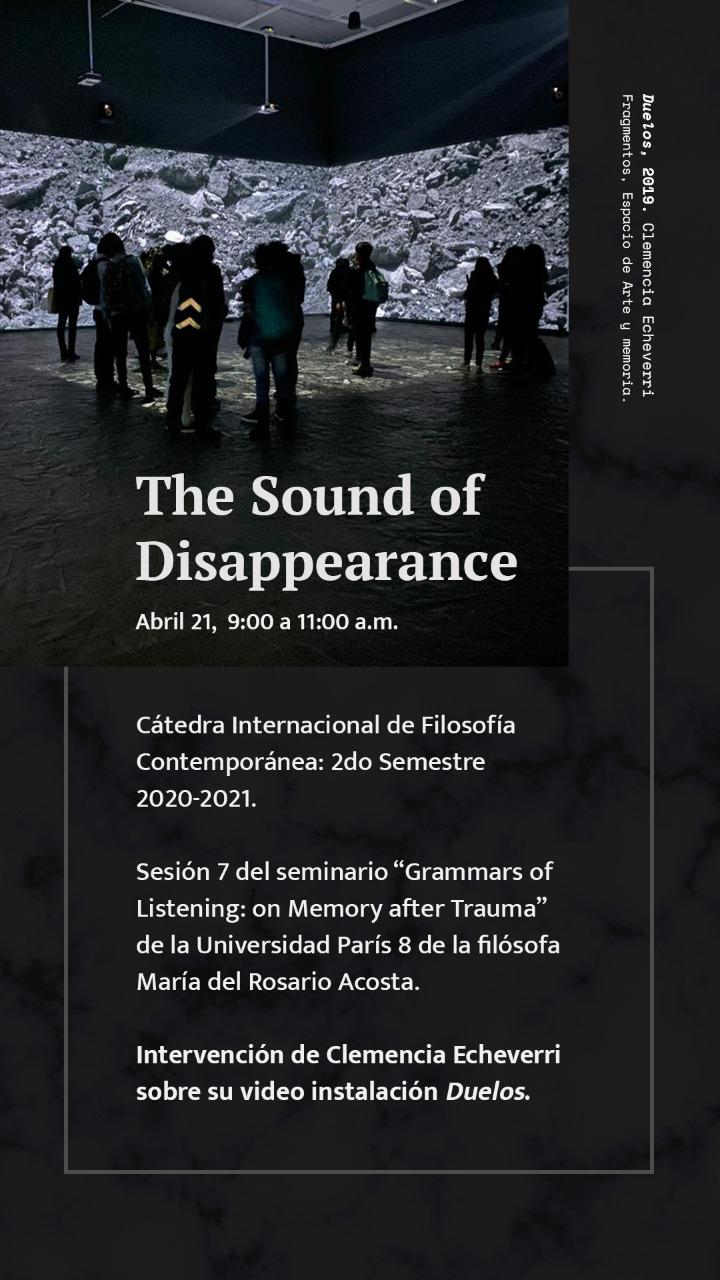Chaire internationale de philosophie contemporaine de l’Université Paris 8. María del Rosario Acosta López (Université de Californie à Riverside) : Grammars of Listening : On Memory After Trauma. 10.03-12.04.2021
Ouverture de la Chaire internationale de philosophie contemporaine de l’Université Paris 8
María DEL ROSARIO ACOSTA LÓPEZ
PR, Département d’études hispaniques, Université de Californie à Riverside
Conférence
10 mars 2021 à 16h
From Aesthetics as Critique to Grammars of Listening :
On Reconfiguring Sensibility as a Political Task
Visioconférence
https://zoom.us/j/98839171696?pwd=SHBxdGVaOXpMUDdwaEhhTkRHV3ZDZz09
ID de réunion : 988 3917 1696 | Mot de passe : PHILO
SÉMINAIRES
Grammars of Listening : On Memory After Trauma
10 Mars - 12 Mai 2021
Aesthetics as Critique : From the Critique of Aesthetics to a Decolonial Perspective
2 Avril - 6 Juin 2021
Contact
acostaparisviiiseminars@gmail.com
Le Département de philosophie et le Laboratoire d’études et de recherche sur les Logiques Contemporaines de la Philosophie de l’Université Paris 8 ont le plaisir de vous annoncer le programme de séminaires de la Professeure María del Rosario Acosta López (UC Riverside), première Professeure invitée élue sur la Chaire Internationale de Philosophie Contemporaine sous l’égide d’un Conseil Scientifique International.
Le premier séminaire, Grammars of Listening : On Memory After Trauma, se tiendra le Mercredi 16:00-18:00h. Les 8 séances de séminaire commencent le 10 Mars et se concluent le 12 Mai 2021 (avec interruption le 28 Avril et le 5 Mai).
Le deuxième séminaire, Aesthetics as Critique : From the Critique of Aesthetics to a Decolonial Perspective, se tiendra le Vendredi 17:00-19:00h. Les 8 séances de séminaire commencent le 2 Avril et se concluent le 4 Juin 2021 (avec interruption le 30 Avril et le 7 Mai).
Les deux séminaires se tiendront en anglais sur la plateforme Zoom.
Vous êtes toutes et tous cordialement invités à suivre ces deux séminaires (niveau Master + Doctorat).
Chaque séminaire est validable au titre de la formation doctorale à Paris 8 et peut être suivi hors validation dans le cursus du Master Philosophie de Paris 8. Mais ils sont bien sûr ouverts à tous niveaux en tant qu’ ‘auditeurs libres’.
Vous trouverez ci-dessous une courte bio-bibliographie de la Professeure María del Rosario Acosta López, la présentation des deux séminaires (avec bibliographie) et les liens Zoom pour assister chaque semaine au séminaire.
María del Rosario Acosta López est Professeure titulaire du Département d’Études hispaniques de l’Université de Californie à Riverside depuis 2019. Elle est Docteure de philosophie de l’Université nationale de Colombie et était Professeure Assistante de l’Université des Andes à Bogota avant d’enseigner aux États-Unis en tant que Professeure Assistante de philosophie à l’Université DePaul. Elle enseigne et mène des recherches sur l’esthétique, la théorie critique, la philosophie politique et, plus récemment, sur les études décoloniales, en mettant l’accent sur les questions de mémoire et de traumatisme dans les Amériques. Acosta dirige également des ateliers sur la mémoire libératrice, s’occupe des questions de mémoire historique dans des contextes de justice transitionnelle et a travaillé avec des survivants de la violence politique, en Colombie avec des communautés survivant à la violence paramilitaire et plus récemment à Chicago avec des survivants de la torture policière.
Ses publications les plus récentes sont consacrées à l’esthétique de F. Schiller, l’esthétique de la résistance dans l’art latino-américain, les perspectives décoloniales sur la mémoire et l’histoire ainsi que sur l’injustice et la violence épistémiques. Elle travaille actuellement à la révision finale de son prochain livre, Gramáticas de lo inaudito : pensar la memoria después del trauma (Herder, 2022), et à l’édition de deux livres à paraître, l’un en espagnol sur la communauté chez Hegel, Nancy, Esposito et Agamben (Narrativas de la comunidad : de Hegel a los pensadores impolíticos), un autre en anglais, The Unstoppable Murmur of Being-Together, co-écrit avec Jean-Luc Nancy et le Groupe sur le droit et la violence. Un livre sur le projet politico-esthétique de Schiller, provisoirement intitulé Aesthetics as Critique, est également en préparation.
Grammars of Listening : On Memory After Trauma
Mercredis 16h00-18h00. 8 séances : 10 Mars - 12 Mai 2021 (pause les 28 Avril et 5 Mai)
1ère séance : 10 Mars 2021 à 16h

Visioconférence des séances
https://zoom.us/j/98839171696?pwd=SHBxdGVaOXpMUDdwaEhhTkRHV3ZDZz09
ID de réunion : 988 3917 1696 | Mot de passe : PHILO
Site Internet du séminaire
https://grammarsoflistening.wordpress.com

Visite de Clemencia Echeverri, lors de la 7ème séance le 21 Avril 2021
Site Internet de l’artiste
This seminar inquires into the kinds of “grammars” that would need to be inaugurated in order to render audible what otherwise remains unheard and unheard-of as a consequence of what we will analyze as “traumatic forms of violence” – in their capacity to silence, erase, hide and deny their own shattering effects. By “grammars” we will understand frameworks of sense broadly speaking – taking sense here both in terms of the sensible as well as in terms of meaning, conceptual and otherwise. Accordingly, to ask about these grammars is to ask how to radically redistribute sense in order to subvert the frameworks that decide in advance what “deserves” to be audible, memorable, grievable—or not. In Spanish I call them “gramáticas de lo inaudito,” since the word “inaudito” points both to the unheard and the unheard-of, namely, what hasn’t (yet) been rendered audible and what is ethically unacceptable. The seminar will trace the close connection between the two : it is precisely because traumatic violence inaugurates unprecedented forms of harm – forms of harm absolutely unheard of and which thus challenge our ethical imagination in radical ways – that we do not yet have the grammars to approach them properly and make them audible, much less intelligible or even believable. We will approach the subject by asking first about “trauma” from a philosophical perspective, inquiring into the kind of challenges it poses to our conceptions of experience, in order then to move into questions around the possibilities of its representation, memorialization and historical indexation – that is, into the conditions of possibility of more radical form of listening. Art will play an essential role in this context, and we will study ways in which works of art resist oblivion and inaugurate grammars that make audible what has been rendered inaudito (we will bring in examples from Latin America, in contexts of political violence where we find radical forms of silencing and erasure).
For updates on the seminar sessions, announcements, and discussion forums after the seminar, refer to https://grammarsoflistening.wordpress.com.
All the readings will be uploaded online in a google drive. To access the drive and subscribe to the seminar’s email list please send your name, institutional affiliation (if any) and short description of your interests to acostaparisviiiseminars@gmail.com.
Ce séminaire s’interroge sur les types de "grammaires" qu’il faudrait inaugurer pour rendre audible ce qui, autrement, reste inaudible et inouï, conséquence de ce que nous analyserons comme des "formes traumatisantes de violence" - dans leur capacité à silencier, à effacer, à cacher et à nier leurs propres effets bouleversants. Par "grammaires", nous entendons les cadres de sens au sens large - qui prennent ici tout leur sens en termes de sens et de signification, conceptuelle et autre. Par conséquent, s’interroger sur ces grammaires, c’est se demander comment redistribuer radicalement le sens afin de subvertir les cadres qui décident à l’avance de ce qui "mérite" d’être audible, mémorisable, critiquable - ou non. En espagnol, je les appelle "gramáticas de lo inaudito", car le mot "inaudito" désigne à la fois ce qui n’a pas été entendu et ce qui est inouï, c’est-à-dire ce qui n’a pas (encore) été rendu audible et ce qui est éthiquement inacceptable. Le séminaire retracera le lien étroit entre les deux : c’est précisément parce que la violence traumatique inaugure des formes de dommages sans précédent - des formes de dommages absolument inouïes et qui défient donc notre imagination éthique de manière radicale - que nous ne disposons pas encore des grammaires pour les aborder correctement et les rendre audibles, encore moins intelligibles ou même crédibles. Nous aborderons le sujet en nous interrogeant d’abord sur le "traumatisme" d’un point de vue philosophique, en nous interrogeant sur le type de défis qu’il pose à nos conceptions de l’expérience, pour ensuite nous interroger sur les conditions de possibilité de sa représentation, de sa mémorisation et de son indexation historique - c’est-à-dire sur les conditions de possibilité d’une forme d’écoute plus radicale. L’art jouera un rôle essentiel dans ce contexte, et nous étudierons comment les œuvres d’art résistent à l’oubli et inaugurent des grammaires qui rendent audible ce qui a été rendu inaudito (nous apporterons des exemples d’Amérique latine, dans des contextes de violence politique où nous trouvons des formes radicales de silence et d’effacement).
Pour les mises à jour des sessions du séminaire, les annonces et les forums de discussion après le séminaire, consultez le site https://grammarsoflistening.wordpress.com/.
Toutes les lectures seront téléchargées en ligne sur un google drive. Pour y accéder et vous inscrire à la liste de diffusion du séminaire, veuillez envoyer votre nom, votre affiliation institutionnelle (le cas échéant) et une brève description de vos intérêts à acostaparisviiiseminars@gmail.com.
Lectures/séances :
Session 1 (March 10) : From Aesthetics as Critique to Grammars of Listening : On Reconfiguring Sensibility as a Political Task (introduction to both seminars)
Session 2 (March 17) : Trauma and the Breakdown of all Grammar
Main reading : Freud, S. “Beyond the Pleasure Principle,” in The Standard Edition of the Works of Sigmund Freud, vol. 18 (London : Hogarth, 1953), sections I-IV, pp. 7-33. Recommended : Caruth, C. Unclaimed Experience : Trauma, Narrative and History (Baltimore : John Hopkins University Press, 1996), Introduction and Conclusions ; Caruth, C. Literature in the Ashes of History (Baltimore : John Hopkins University Press, 2013), Chapter 1. Other : Berlant, L. Cruel Optimism (Durham, NC : Duke University Press, 2011), Chapter 2 ; LaCapra, D. “Traumatropisms”. History and its Limits. Human, Animal, Violence (Ithaca : Cornell University Press, 2009), 59- 89 ; Pe ?rez, J.D. “Hacia una (re)vocalizacio ?n del trauma : una cri ?tica a Caruth desde la e ?tica de la escucha,” Peri ?frasis 9:18 (2018) : 117-133 ; Rottenberg, E. “Freud’s Other Legacy”, Parrhesia 21 (2014) : 13-22.
Session 3 (March 24) : Storytelling and Grammars of Silence
Main reading : Benjamin, W. “The Storyteller”, Illuminations : Essays and Reflections (NY : Schocken, 1969) : 83- 110. Recommended : Oyarzun, P., “Narration and Justice,” in Doing justice : Three essays on Walter Benjamin (Polity Press, 2020), 75-107 ; Wynter, S. “Novel and History, Plot and Plantation,” Savacou, no. 5 (June 1971) : 95-102. Other : Castillejo-Cuellar, A. “La localizacion del dano : Etnografia, espacio y confesion en el escenario transicional colombiano,” Horizontes Antropologicos 20:42 (2014) : 213-236, Acosta Lopez, M.R. “La narracion y la memoria de lo inolvidable. Un comentario al ensayo “El narrador” de Walter Benjamin,” in Andrade, M. (ed.), Walter Benjamin, aqui y ahora (Bogota : Universidad de los Andes, 2018), 175-196.
Session 4 (March 31) : Grammars of Listening and the Task of Imagination
Main readings : Arendt H. Origins of Totalitarianism, Chapter 12 and 13 (Harcourt, 1973) : 389-480 ; Arendt, H. “Understanding and Politics”. Essays in Understanding (Schocken : New York, 2004), 307-327. Recommended : Sharpe, C. In the Wake (Duke University Press, 2016), Chapters 1 and 4 ; Acosta Lo ?pez, M.R. “Totalitarianism as Structural Violence : Towards New Grammars of Listening,” in O’Byrne, A. and Shuster, M. Logics of Genocide : The Structures ofViolence and the Contemporary World (London/NY : Routledge, 2020) : 173-186.
Session 5 (April 7) : On Political Violence and the Colonization of Listening
Main readings : Cavarero, A. “The Vocal Body,” Qui parle, 21(1) (2012) : 71-83 ; Cavarero, A. Horrorism : Naming Contemporary Violence (NY : Columbia UP, 2009) (selections TBA) ; Dorfman, A. Death and the Maiden (New York : Penguin Books, 1991). Recommended : Cavarero, A. Relating Narratives. Storytelling and Selfhood (NY : Routledge, 2000) (selection TBA) ; Fanon, Franz Black Skin, White Masks, trans. Richard Philcox (New York : Grove Press, 2008, Chapter 5 ; Vallega, A. “Displacements—Beyond the Coloniality of Images”, Research in Phenomenology 41 (2011) 206–227 Other : Acosta Lo ?pez, M.R. “Perder la voz propia : de una fenomenologi ?a feminista de la voz a una aproximacio ?n a la violencia poli ?tica desde la escucha,” commisioned for Luciana Cadahia and Ana Carrasco Conde, Fuera de si ? mismas. Motivos para dislocarse (Madrid, Herder, 2020) : 121-156.
Session 6 (April 14) : Listening to the Erasures of History
Main readings : Garcia Marquez, G. One Hundred Years of Solitude (selected fragment). Recommended : Acosta Lopez, M.R. “One Hundred Years of Forgotteness : Aesth-Ethics of Memory in Latin America,” Philosophical Readings, Special Issue on Philosophy in Colombia, XI:3 (2019) 163-17. Other : Acosta Lopez, M.R. “La Resistencia de lo inarchivable : del mito a la historia en Musa Paradisiaca de Jose Alejandro Restrepo,” in Dialogo : a Journal for Latin American Studies 22:2 (2019) 35-48 ; Caruth, C. Literature in the Ashes of History (Baltimore : John Hopkins University Press, 2013), Chapter 5 ; Mendoza, A and Thomas, T. “Literary and Visual Rememory at the 90th Anniversary of the Banana Massacre in Colombia” (cf. https://zapruderworld.org/volume-5/literary-and-visual-rememory-at-the-90th-anniversary-of-the-banana-massacre-in-colombia/) ; Uribe, A. “¿Pueden los hechos historicos resistirse a la mendacidad ? Sobre la matanza de las bananeras,” Revista Co-herencia 7:13 (2010), 43-67.
Session 7 (April 21) : The Sound of Disappearance
With the presence and intervention of Clemencia Echeverri, artist.
For this session and in preparation for Clemencia Echeverri’s visit to class, please have a look at her work Duelos (available here), as well as Professor Acosta’s interview with her (available with English subtitles here).
Main readings : J.D. Pe ?rez, “Sonorous Rubble, Mourning Affect,” in Echeverri, C. Duelos (Museo Nacional y Ministerio de Cultura, 2019) 66-79 ; Acosta Lo ?pez, M.R. “Art as Resistance to Erasure : on Fragmentos by Doris Salcedo and Duelos by Clemencia Echeverri”, in Lina Britto and Ricardo Lo ?pez-Pedreros, Colombia Revisited (2 vols) (NY : Routledge, forthcoming). Recommended : Chirolla, G. “The Politics of the Scream in a Threnody,” in Zepke, S. and Sullivan, S. (eds.) Deleuze and Contemporary Art (Edinburgh University Press, 2010), 15-33 ; Uribe, M.V. “Against Violence and Oblivion : The Case of Colombia’s Disappeared,” in Polit Duen ?as, G. and Rueda, G. (eds.) Meanings of Violence in Contemporary Latin America (Palgrave) : 38-52 Other : Bargu, B. “Sovereignty as Erasure. Rethinking Enforced Disappearances,” Qui Parle : Critical Humanities and Social Sciences 23 : 1 (2014) : 35-75.
NOTE : this session could be moved to the last session and session 8 would become the 7th. Follow announcements in the worldpress blog for an update later during the semester.
Session 8 (May 12) : Decolonizing Grammars, Decolonizing Memory — Session postponed to a date to be announced in june.
Encina, P. Hamaca Paraguaya (film). Recommended : Acosta Lo ?pez, M.R. “Hamaca Paraguaya de Paz Encina (notas sobre la resistencia de la memoria)” ; N. Brizuela, “A Sense of Place : Paz Encina’s Radical Poetics”, Film Quarterly 70 : 4 (2017) 49-64 Other : Acosta Lo ?pez, M.R. “Grama ?ticas de lo inaudito as Decolonial Grammars : Notes for a Decolonization of Memory,” in Alejandro Vallega (ed.) Philosophy and Liberation in Latin America, a Primary Source Reader (London : Bloomsbury, forthcoming) ; S. Rivera Cusicanqui, “Palabras ma ?gicas : reflexiones sobre la crisis presente” y “Oralidad, mirada y memoria del cuerpo en los Andes”, Un mundo ch’ixi es posible (Buenos Aires : Tinta limo ?n, 2018) 93-134 ; Roci ?o Zambrana, “Vida po ?stuma” https://www.80grados.net/vida-postuma/
Lectures principales / Main readings :
Acosta López, M.R. “Gramáticas de lo inaudito as Decolonial Grammars : Notes for a Decolonization of Memory,” in Alejandro Vallega (ed.) Philosophy and Liberation in Latin America, a Primary Source Reader (London : Bloomsbury, forthcoming).
Freud, S. “Beyond the Pleasure Principle,” in The Standard Edition of the Works of Sigmund Freud, vol. 18 (London : Hogarth, 1953).
Benjamin, W. “The Storyteller”, Illuminations : Essays and Reflections (NY : Schocken, 1969) : 83- 110.
Hannah Arendt, Origins of Totalitarianism, Chapter 12 and 13 (Harcourt, 1973) : 389-480.
Cavarero, A. Relating Narratives. Storytelling and Selfhood (NY : Routledge, 2000), “The Vocal Body,” Qui parle, 21(1) (2012) : 71-83 and Horrorism : Naming Contemporary Violence (NY : Columbia UP, 2009) (selections).
Dorfman, A. Death and the Maiden (New York : Penguin Books, 1991) [“Being Robbed of One’s Voice : On Listening and Political Violence in Adriana Cavarero” in Political Bodies : Writings on Adriana Cavarero’s Political Thought, P. Landerreche Cardillo and R. Silverbloom eds. (Albany : SUNY Press, forthcoming).]
Llosa, C. La teta asustada (film) [Theidon, K. “The milk of sorrow,” Canadian Women Studies, 27:1 (2019) : 8-16.]
García Márquez, G. One Hundred Years of Solitude (selected fragment) [Acosta López, M.R. “One Hundred Years of Forgotteness : Aesth-Ethics of Memory in Latin America,” Philosophical Readings, Special Issue on Philosophy in Colombia, XI:3 (2019) 163-171.]
Acosta López, M.R. “Art as Resistance to Erasure : on Fragmentos by Doris Salcedo and Duelos by Clemencia Echeverri”, in Lina Britto and Ricardo López-Pedreros, Colombia Revisited (2 vols) (NY : Routledge, forthcoming).
Encina, P. Hamaca Paraguaya (film) [Acosta López, M.R. “Hamaca Paraguaya de Paz Encina (notas sobre la resistencia de la memoria)”.]




